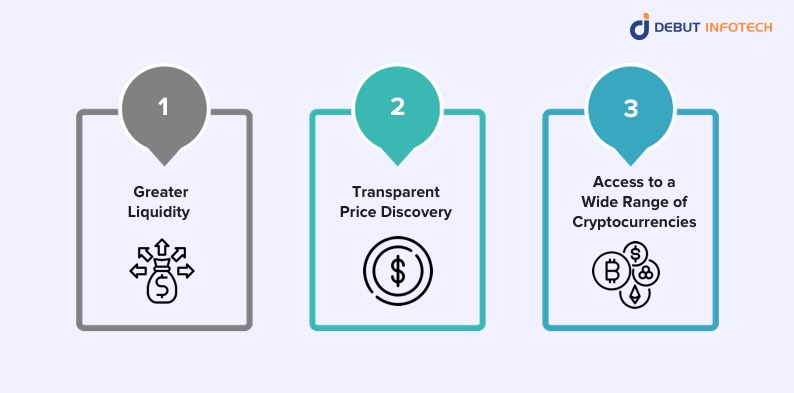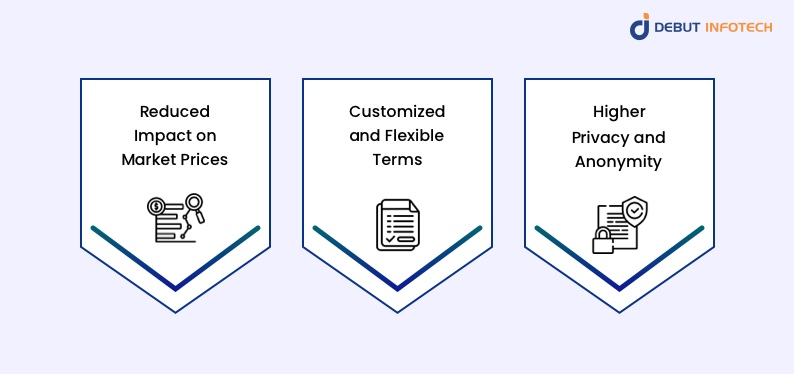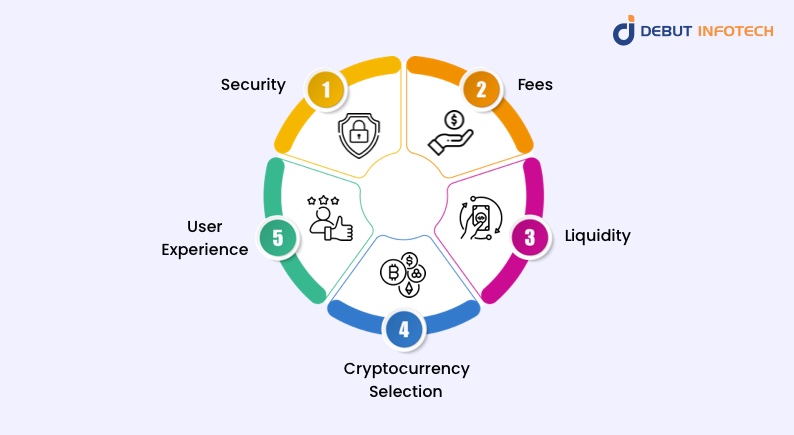Table of Contents
Home / Blog / Cryptocurrency
Crypto Exchange vs. OTC Exchange: Which Platform Is Right for You?
January 20, 2025

January 20, 2025
Cryptocurrency trading has revolutionized the financial sector, creating new opportunities for investors to engage with the market.
Exchange and over-the-counter (OTC) exchange platforms are two of the most common trading platforms. With the recent surge in the OTC crypto market, many investors are considering choosing OTC platforms over classic exchanges. According to an in-depth analysis of 4 million spot trades by Finery Markets, total OTC trading volume experienced a 106% year-over-year increase, with stablecoin transactions showing an even more substantial rise of 147%.
Despite supporting crypto transactions, crypto exchange and OTC platforms have unique features that are specifically geared to user needs. Knowing the differences is necessary to help you make choices.
This guide will walk you through the main elements of both exchange and OTC platforms to settle the debate on Crypto Exchange vs OTC Exchange. You will also learn their pros and cons and essential things to keep in mind when selecting which platform will be best for you.
Shape the Future of Cryptocurrency Trading with Your Own OTC Exchange
Combine innovation and cutting-edge technology to develop an OTC platform that redefines crypto transactions. Let’s build something extraordinary together!
What is an Exchange Crypto Platform?
Exchange crypto platforms are centralized or decentralized digital marketplaces where users can buy, sell and trade cryptocurrencies. Popular examples include Binance, Coinbase, and Kraken. These platforms offer user-friendly interfaces, real-time market data, and advanced trading tools for retail and institutional traders alike.
Types of Exchange Crypto Platforms
Here are the major types of Crypto Exchange platforms:
1. Centralized Exchanges (CEX)
Centralized crypto exchanges are platforms managed by a central authority, acting as intermediaries for trading. They provide user-friendly interfaces, robust liquidity, and advanced trading tools. However, users must complete KYC verification and trust the platform to safeguard funds, making them less private compared to other options.
2. Decentralized Exchanges (DEX)
Decentralized crypto exchanges operate on blockchain technology, allowing peer-to-peer trading without intermediaries. They prioritize privacy, security, and transparency, as trades are executed through smart contracts. While DEX platforms provide greater control over funds, they may lack the liquidity and user-friendliness found in centralized alternatives.
Pros of Exchange Platforms

Here are some benefits of exchange trading platforms:
1. Greater Liquidity
Exchanges handle large trading volumes daily, ensuring traders can buy or sell assets quickly without waiting for a counterparty. High liquidity reduces slippage, offering better execution prices. This feature is particularly advantageous during volatile market conditions, as traders can swiftly respond to price fluctuations.
2. Transparent Price Discovery
Public order books allow users to see real-time bid and ask prices, promoting fair and transparent trading. This transparency helps traders make informed decisions based on accurate market data, reducing the likelihood of unfavorable trades due to hidden pricing or lack of market visibility.
3. Access to a Wide Range of Cryptocurrencies
Top decentralized crypto exchanges (and centralized exchanges) typically list hundreds of cryptocurrencies, including major coins like Bitcoin and lesser-known altcoins. This extensive selection allows traders to diversify their portfolios, explore niche projects, and participate in token launches or initial exchange offerings (IEOs), all within a single platform.
Cons of Exchange Trading
Here are the cons of exchange trading platforms:
1. Market Impact for Large Trades
High-volume trades can create significant price movements on exchanges due to limited order book depth. This slippage can lead to less favorable execution prices, especially for institutional investors or traders handling substantial capital, forcing them to split orders across multiple transactions.
2. Limited Privacy
Centralized exchanges often mandate stringent KYC and AML compliance. This requirement means users must share personal and financial information, which could be a deterrent for those prioritizing privacy or operating in regions with restrictive regulations on cryptocurrency trading.
3. Potential for Price Manipulation
While exchanges aim for transparency, the presence of whales or market makers can lead to artificial price fluctuations. Techniques such as spoofing or wash trading may be used to influence prices, potentially misleading smaller traders and causing unexpected losses.
For those considering venturing into crypto exchange development, only partner with a cryptocurrency exchange development company that’s transparent about everything related to crypto exchanges.
What is an OTC Platform?
What is OTC trading crypto? Over-the-counter (OTC) platforms enable direct trade between two parties without the need for a centralized exchange. They are commonly used for large-volume trades that could disrupt market prices on standard exchanges. Examples include Circle Trade and Genesis Trading.
Types of OTC Exchange Platforms
Here are the different types of OTC crypto exchange platforms:
1. Dealer/Trader OTC Platforms
These platforms operate by connecting individual traders or dealers directly for executing trades. Dealers often act as market makers, setting prices for buying and selling assets. Such platforms are ideal for users seeking personalized trade execution without the need for intermediaries, offering flexibility in pricing and negotiation.
2. OTC Brokers
OTC brokers serve as intermediaries between buyers and sellers, facilitating transactions for large trades. They provide services such as price negotiation, risk management, and ensuring counterparty trust. These brokers often cater to institutional clients, offering high levels of discretion, tailored terms, and access to a broad network of trading partners.
3. Exchange OTC Desks
Major cryptocurrency exchanges often offer OTC desks as part of their services, enabling users to execute high-value trades off the main exchange order book. These desks combine the transparency and security of exchanges with the privacy and customization of OTC trading, making them a preferred choice for large investors.
Pros of OTC Trading

Here are the benefits of OTC trading crypto platforms:
1. Reduced Impact on Market Prices
OTC trading executes large transactions discreetly, without affecting public order books. This method is ideal for institutional investors looking to avoid slippage and maintain stable prices during high-volume trades, ensuring optimal execution without alarming the broader market.
2. Customized and Flexible Terms
Unlike exchanges, OTC platforms offer tailored solutions for trade size, settlement schedules, and pricing. This flexibility is highly advantageous for institutional clients or individuals seeking bespoke agreements that accommodate their specific financial strategies or operational requirements.
3. Higher Privacy and Anonymity
OTC desks prioritize discretion, offering private channels for executing trades without public disclosure. This feature particularly appeals to high-net-worth individuals or institutions wishing to maintain confidentiality about their trading activities and avoid scrutiny from competitors or regulators.
Cons of OTC Trading
Here are the disadvantages of OTC Trading platforms:
1. Limited Transparency
Unlike exchanges, OTC trades are not publicly recorded, making it difficult to verify trade volumes or prices. This lack of transparency can lead to discrepancies in pricing or trade execution, requiring users to trust the counterparty or intermediary completely.
2. Higher Counterparty Risk
Crypto OTC exchange trading involves direct interactions between buyers and sellers, increasing the risk of default if either party fails to honor the agreement. Ensuring the reliability of the counterparty or intermediary is critical to mitigate potential losses due to fraud or mismanagement.
3. Potentially Higher Costs for Small Trades
OTC desks often cater to high-volume transactions, imposing minimum trade sizes or premium service fees. Smaller traders may find these costs prohibitive, as the benefits of privacy or tailored terms may not justify the additional expenses incurred.
It’s vital to take note of these benefits and disadvantages if you plan to go into OTC crypto exchange development.
Exchange vs OTC: Comparative Analysis Between OTC Trading and Exchange Platforms
To settle the Crypto Exchange vs OTC Exchange debate, here’s a comparative analysis of both of them:
1. Liquidity Considerations
Over-the-counter (OTC) trading typically exhibits lower liquidity due to its decentralized nature. However, it offers a significant advantage for large-scale transactions by providing higher liquidity without causing drastic price fluctuations.
In contrast, exchange platforms, characterized by a broader participant base, generally ensure higher liquidity for smaller trades, catering effectively to retail traders and minor transactions. High liquidity also encourages businesses to venture into p2p crypto exchange development.
2. Risk Assessment
Risk assessment is crucial when deciding on the Crypto Exchange vs OTC Exchange argument. OTC trading is often associated with heightened counterparty risk, reflecting the likelihood of transaction default by the opposing party.
Meanwhile, exchange trading presents a greater exposure to market risk, where traders face potential losses driven by adverse changes in the overall financial market conditions.
3. Cost Considerations
In Crypto Exchange vs OTC Exchange discussions, Exchange trading typically incurs various costs such as transaction fees, deposit/withdrawal fees, and occasionally wider spreads, particularly during periods of heightened market volatility.
In contrast, OTC trading, which generally involves larger transaction volumes, often allows for the negotiation of lower fees and tighter spreads. This makes OTC trading a more cost-effective option for high-value trades, offering a favorable pricing structure for larger market participants.
4. Accessibility
Exchange platforms, including white label crypto exchange platforms, are widely accessible to a broad range of traders, providing easy entry points for retail and institutional investors. They typically require minimal steps to start trading, making them ideal for beginners and those looking for a straightforward trading experience.
On the other hand, OTC trading, while accessible to large institutional players and high-net-worth individuals, may present higher barriers to entry for smaller traders due to the need for trusted intermediaries and personalized agreements.
5. Asset Selection
Exchange platforms generally offer a diverse selection of assets, including cryptocurrencies, stocks, commodities, and other financial instruments. The availability of various trading pairs provides traders with a broad array of choices and greater market opportunities.
In contrast, OTC trading tends to focus on high-volume or less liquid assets, catering more to specific market demands or tailored transactions, often excluding the variety available on exchanges.
6. Privacy
In the crypto exchange vs OTC exchange debate, one of the crucial advantages of OTC trading is its emphasis on privacy. Transactions are typically conducted directly between two parties, reducing the amount of public visibility compared to exchange platforms. This makes OTC trading appealing to those seeking confidentiality.
Exchange platforms, however, require personal identification and transaction transparency as part of their regulatory compliance, offering less privacy than OTC methods.
7. Price Determination
In exchange trading, prices are determined by the market forces of supply and demand, with continuous adjustments occurring through the bid-ask spread on the platform. This provides a transparent and publicly available price for assets.
OTC trading, however, involves negotiated pricing between parties, often leading to more flexible and tailored pricing terms, though less transparent than exchange-based price discovery.
8. Flexibility
In the crypto exchange vs OTC exchange argument, OTC trading offers greater flexibility due to its customizable nature, allowing parties to negotiate terms based on transaction size, asset type, and other specific requirements. This flexibility is especially valuable for large-scale trades or unique asset types.
While efficient for standardized transactions, exchange platforms generally offer less flexibility as their terms and conditions are predefined by the platform’s rules and protocols.
Factors Influencing Choice
Here are some factors influencing the choice of Crypto Exchange vs OTC Exchange platforms:
1. Size and Nature of the Trade
The decision on the crypto exchange vs OTC exchange debate is often driven by the size and nature of the trade. Large transactions, particularly those that could significantly impact market prices, are typically better suited to OTC trading, as it minimizes the risk of price slippage.
Smaller trades, in contrast, can benefit from the liquidity and transparency offered by exchange platforms, making them ideal for those seeking efficiency in executing low-volume transactions.
2. Desired Level of Privacy
For traders prioritizing privacy, OTC trading offers a distinct advantage. Since transactions are negotiated directly between parties and are not publicly recorded, they provide an additional layer of confidentiality.
On the other hand, exchange trading is inherently more transparent, with trades visible to the public, which may not be appealing to individuals or institutions seeking a higher level of discretion.
3. Market Conditions and Volatility
Market conditions and volatility play a significant role in determining whether OTC or exchange trading is more appropriate. During periods of high market volatility, OTC trading can provide a degree of price stability, shielding traders from erratic price movements.
Conversely, in more stable market conditions, exchange platforms may offer better pricing due to their higher liquidity and competitive nature. It is vital to evaluate the current state of the market to choose the most suitable trading method for your specific needs.
Now you’ve understood the differences in Crypto Exchange vs OTC Exchange, let’s explore factors to consider when choosing a crypto platform.
Choosing the Right Crypto Platform: Key Factors to Consider

Selecting the ideal platform depends on your trading goals, transaction size, and risk tolerance.
Here are some factors to guide your decision:
1. Security
A reliable platform should prioritize robust security protocols such as cold wallet storage, two-factor authentication, and encryption. Check for a proven track record in safeguarding user funds and preventing breaches. Platforms offering insurance coverage for assets provide added peace of mind, ensuring your investments remain protected against unforeseen cyber threats.
2. Fees
Examine the fee structure, including trading, deposit, and withdrawal costs. Some platforms offer tiered fees based on trading volume, which can benefit frequent traders. Pay attention to hidden fees, such as conversion costs for fiat deposits or premium charges for fast withdrawals, to ensure the platform aligns with your budget and trading frequency.
3. Liquidity
High liquidity ensures the swift execution of trades without significantly impacting prices. Platforms with substantial trading volumes and active user bases can accommodate both small and large transactions effectively. Liquidity is especially critical for those trading volatile cryptocurrencies or large quantities, as it reduces slippage and ensures more favorable pricing.
4. Cryptocurrency Selection
The availability of a wide range of cryptocurrencies allows for diversification. While major exchanges offer extensive options, some focus on niche tokens or initial coin offerings (ICOs). Evaluate whether the platform supports both popular cryptocurrencies like Bitcoin and Ethereum, as well as emerging altcoins that align with your trading or investment strategy.
5. User Experience
An intuitive interface and responsive design enhance usability, whether you’re a beginner or an experienced trader. Platforms offering advanced trading tools, such as charting software, APIs, and educational resources, cater to diverse user needs. Additionally, prioritize platforms with efficient customer support channels, such as live chat or email, to resolve issues promptly.
Simplify Large-Scale Crypto Trades with a Powerful OTC Solution
Design an OTC exchange that’s secure, fast, and scalable, making crypto trading easier for institutional and retail users alike. Partner with us to create yours!
Conclusion
Your trading needs will ultimately determine whether you will choose an exchange or OTC crypto trading platform.
For the Crypto Exchange vs OTC Exchange debate, Exchanges are great for smaller to medium-sized trades, benefiting from liquidity, transparency, and accessibility. On the other hand, OTC platforms provide privacy, flexibility and minimize market impact, serving high-volume traders and institutions.
By considering aspects such as security, fees, liquidity, cryptocurrency selection, and user experience, you can choose the option that best fits your objectives and trading preferences.
Since navigating the crypto market can be complex, you need the right platform to help you trade confidently and maximize your potential.
FAQs
The main difference is where the trading happens. Exchanges are public platforms with order books showing prices. On the other hand, OTC (over-the-counter) trading is private and direct, usually between two parties, without public price listings or an intermediary platform.
OTC trading happens directly between buyers and sellers, often facilitated by brokers or trading desks. Instead of using a public order book, deals are negotiated privately, making it ideal for large trades to avoid slippage or impacting the market price.
Both have risks. Exchanges face issues like hacking or slippage during high-volume trades. In contrast, OTC trades carry counterparty risk if the other party doesn’t deliver. Picking the right method depends on your comfort level with these risks.
OTC trading is generally better for large trades. It prevents price slippage, as deals are private and negotiated directly. Exchanges, with visible order books, can cause prices to spike or drop when trading significant amounts.
No, not all cryptocurrencies are available for OTC trading. Most OTC platforms focus on high-demand assets like Bitcoin and Ethereum. Exchanges, however, typically support a wider range of cryptocurrencies.
Talk With Our Expert
Our Latest Insights
USA
2102 Linden LN, Palatine, IL 60067
+1-703-537-5009
[email protected]
UK
Debut Infotech Pvt Ltd
7 Pound Close, Yarnton, Oxfordshire, OX51QG
+44-770-304-0079
[email protected]
Canada
Debut Infotech Pvt Ltd
326 Parkvale Drive, Kitchener, ON N2R1Y7
+1-703-537-5009
[email protected]
INDIA
Debut Infotech Pvt Ltd
C-204, Ground floor, Industrial Area Phase 8B, Mohali, PB 160055
9888402396
[email protected]




Leave a Comment